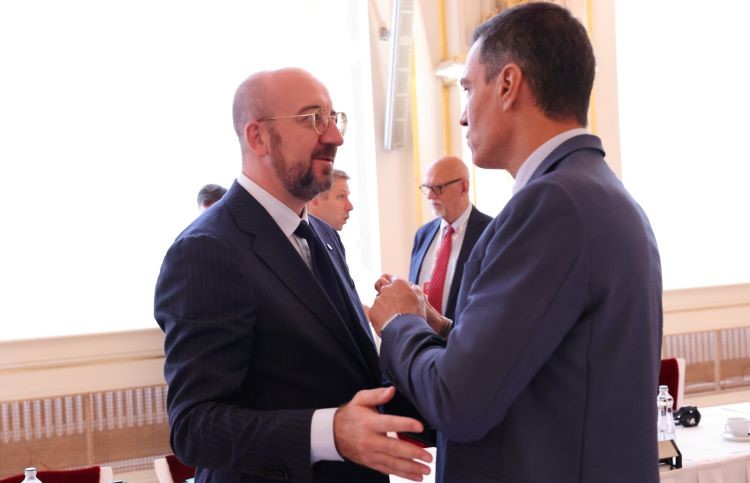The Diplomat
The problems of energy supply in Europe, especially aggravated by the war in Ukraine, are the protagonist of the participation of the President of the Government, Pedro Sánchez, in the first Summit of the European Political Community, held yesterday in Prague, and in the Informal meeting of the European Council, which will take place today in the Czech capital.
The European Political Community Summit – an initiative of the French President, Emmanuel Macron, to promote political dialogue and cooperation on issues of common interest and to strengthen the security, stability and prosperity of the European continent – held its first meeting yesterday at Prague Castle, with the participation of the leaders of 44 European countries, the 27 EU Member States and others as relevant as the United Kingdom, Ukraine, Serbia and Turkey.
During the meeting, several round tables were held on cooperation in security and migration and economy and energy, and included the telematic intervention of the President of Ukraine, Volodímir Zeleznski, and the attendance of the new British Prime Minister, Liz Truss, and the President of Turkey, Recep Tayyip Erdogan, who held a closed-door meeting with Pedro Sánchez in the margins of the summit.
A day after Pedro Sánchez and the German Chancellor, Olaf Scholz, defended at the Spanish-German Summit in A Coruña the “utmost importance” of the MidCat gas pipeline and the need for it to be operational by 2025, Emmanuel Macron reaffirmed yesterday, on his arrival in Prague, his opposition to the Trans-Pyrenees gas pipeline on the grounds that there is a problem of “overcapacity” in the pipelines connecting Spain and France and, moreover, it would take too long to build. On the other hand, the French leader urged Spain to strengthen electricity interconnections because “what Europe needs in the coming years is to produce more electricity in its territory and to have a strategy on renewables and nuclear power”.
On his arrival at the Summit, Pedro Sánchez praised the proposals presented by the President of the European Commission, Ursula Von der Leyen, to tackle the energy crisis because, he said, they coincide with “many of the proposals that Spain has been defending for many months, even before the war”. Specifically, the President of the Government highlighted Von der Leyen’s proposals (put forward the previous day before the European Parliament) to set “a ceiling price for all gas imported by the EU”, to favor “joint and centralized purchases of gas from third countries”, to face a “structural reform of the electricity market” and to extend “the reality of the Iberian exception to the EU as a whole”.
During his speech at the European Political Community (EPC) Summit, Mr. Sánchez pointed out that it is a priority to continue carrying out emergency actions coordinated at European level in three areas to control the price of energy: limiting gas prices, reinforcing liquidity and centralized gas purchasing at European level. “The participation of non-EU countries in these measures would be of greater benefit to the European Political Community as a whole,” he said. He also defended the need to strengthen interconnections, pooling electricity and gas infrastructures in Europe, to achieve greater energy sovereignty, and urged to accelerate the deployment, storage and efficiency of renewables, particularly green hydrogen, key to a clean, secure and affordable energy future.
Sánchez will have the opportunity to defend his proposals today during the Informal European Council meeting, which will address, among other issues, “the three most pressing and interconnected issues facing the Union: Russia’s war in Ukraine, energy and the economic situation”, as reported by the EU. On energy, the leaders of the 27 “will discuss how to ensure security of supply and continued affordability of energy for households and businesses, especially in view of the onset of winter,” assess “decisions already taken in this regard” and formulate “orientations for further reforms and measures to be undertaken to ensure a well-coordinated European response,” the Council added.
Bilateral meetings
On the other hand, the President of the Government yesterday held several bilateral meetings with heads of State or Government of different countries, with whom he discussed Spain’s upcoming presidency of the EU in the second half of 2023: the President of the Swiss Confederation, Ignazio Cassis, the Prime Minister of Albania, Edi Rama; the President of Moldova, Maia Sandu; and the aforementioned meeting with Erdogan, with whom he spoke about the EU accession negotiations and about the situation in Ukraine and the need for the grain export agreement to be extended.







